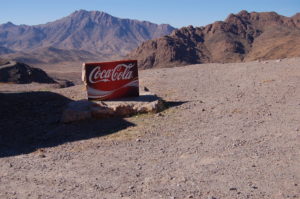Progress

A Coca Cola advertisement in the Atlas Mountains in Morocco. Photograph: https://upload.wikimedia.org/wikipedia/commons/d/d9/Coca-Cola_Morocco.jpg
Glass skyscrapers in city centres are the easily recognisable features of a global metropolis. High-rising urban centres are contrasted with flat suburbs. Former farmlands and pastures, meadows and groves are replaced with uniform-looking houses. Nature here now means lawns, pruned hedges and trees planted in straight rows. The term blandscaping has come to refer to landscape design based on uniform trends and habits that destroy the unique natural environment and ecological values.
Unfortunately, progress means development at the expense of something. When buildings are erected on an empty site, it is vegetation that must go, whereas in the city it is mostly earlier buildings that will be demolished. In Tallinn, for example, the former building of the Ministry of Finance on Pärnu Road and the Sakala Centre near the Estonia Concert Hall have disappeared in this way. Soon the so-called Developers’ House across the street from Tallinn Department Store will be torn down and replaced with new buildings, but the Department Store itself will also be demolished along with the imposing hall of the Central Market. All of these outstanding buildings date back to the Soviet era, so there is a risk that the Soviet era will disappear completely from the cityscape if such developments continue. The new apartments and commercial spaces are more expensive, so the former occupants usually do not return. This creates areas in the city where people with lower incomes have no business in. Even today, Tallinn is the fastest segregating city in Europe,1https://arileht.delfi.ee/news/uudised/tallinna-ahvardab-juba-lahikumnenditel-sotsiaalne-ja-ruumiline-lohestumine?id=88073131 which means that, as the construction frenzy continues, the city risks becoming a breeding ground for inequality and acute conflict.